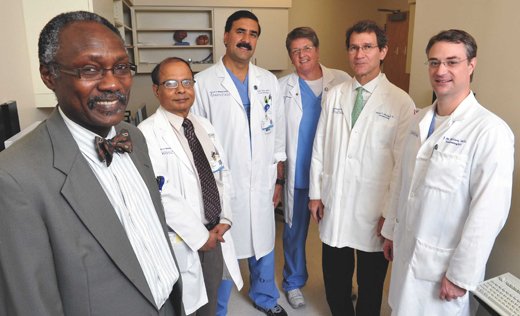UMMC Epilepsy Center Director Seeks to Educate Public About Largely Misunderstood Disorder

Patients with epilepsy, like those struggling with mental illness, often are stigmatized by a lack of public understanding of the seizure disorder’s symptoms and causes and the physical and emotional toll it takes.
Dr. Abuhuziefa Abubakr, professor of neurology at the University of Mississippi Medical Center, wants to raise awareness of treatment options that will help patients with epilepsy improve their quality of life and educate the public about the disorder.
Abubakr is the new director of UMMC’s Level 4 Comprehensive Epilepsy Center, the only one of its type in the state. A level 4 designation means the center offers a full-range of treatment options, from medications to surgery, as well as ongoing clinical research to find better treatment solutions.
Abubakr and a team of neurologists, neurosurgeons and other specialists evaluate patients to find the appropriate care in the management of epilepsy in adults and children. Additionally, Abubakr said the center trains the next generation of health-0care providers in epilepsy and neurophysiology.
“There is a great opportunity to provide good quality care for patients here,” Abubakr said. “The state is in need of a center of excellence to provide all treatment of epilepsy.”
Epilepsy is a condition that produces seizures affecting a variety of mental and physical functions. When a person has two or more unprovoked seizures, they are considered to have epilepsy.
A seizure happens when a brief, strong surge of electrical activity affects part or all of the brain, according to the national Epilepsy Foundation.
Seizures can last from a few seconds to a few minutes, causing symptoms from convulsions and loss of consciousness to some that are not always recognized as seizures by the person experiencing them or by health-care professionals, such as blank staring, lip smacking or jerking movements of the arms and legs.
Tres Townsend, executive director of the Epilepsy Foundation of Mississippi, said educating the public about the disorder is the cornerstone of the organization’s mission. He said some adults mistakenly still have the old belief that a person having a seizure is “possessed,” and children with epilepsy are targets for bullies at school.
Townsend said people may be surprised to know that one out of 26 Americans will experience a seizure at some point in his or her life, according to an Institute of Medicine report. She said the dearth of neurologists who specialize in epilepsy is a problem in Mississippi as it is nationwide.
“We look forward to working with a facility like UMMC where the level of care is so great,” she said. “We often have patients calling us to find a doctor and it’s nice to have the center.”
Abubakr said the condition’s impact on a patient’s quality of life is profound. Epilepsy affects the ability to drive, work independently, conduct personal relationships and learn because of memory difficulties. Sometimes the disorder is inherited and other times it’s the result of brain injury or tumors.
The team of epilepsy specialists performs a complete patient evaluation, which includes advanced tests for seizure diagnosis and classifications and whether medication or surgery is the best treatment option. Abubakr’s team also works with female patients who may want to become pregnant.


